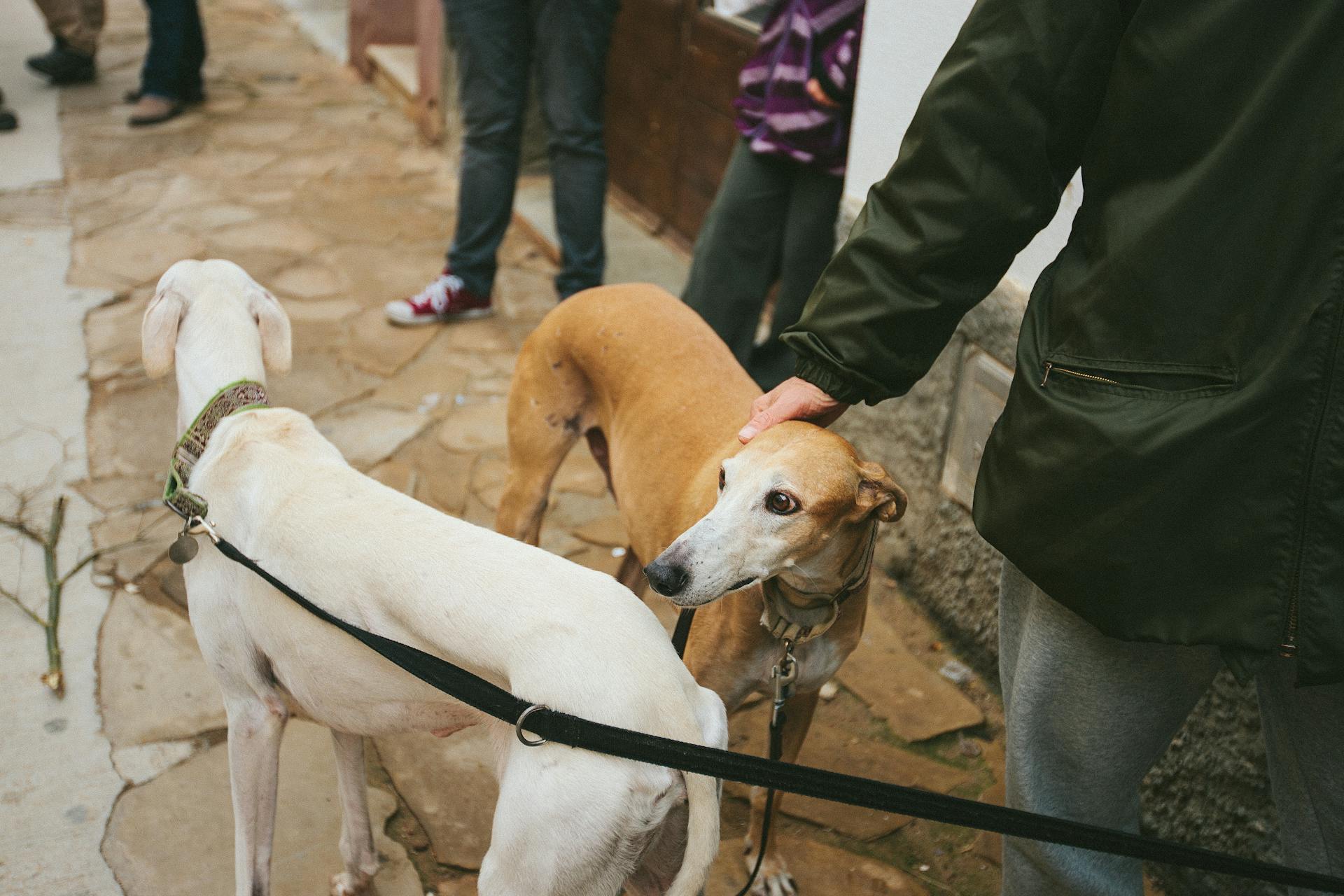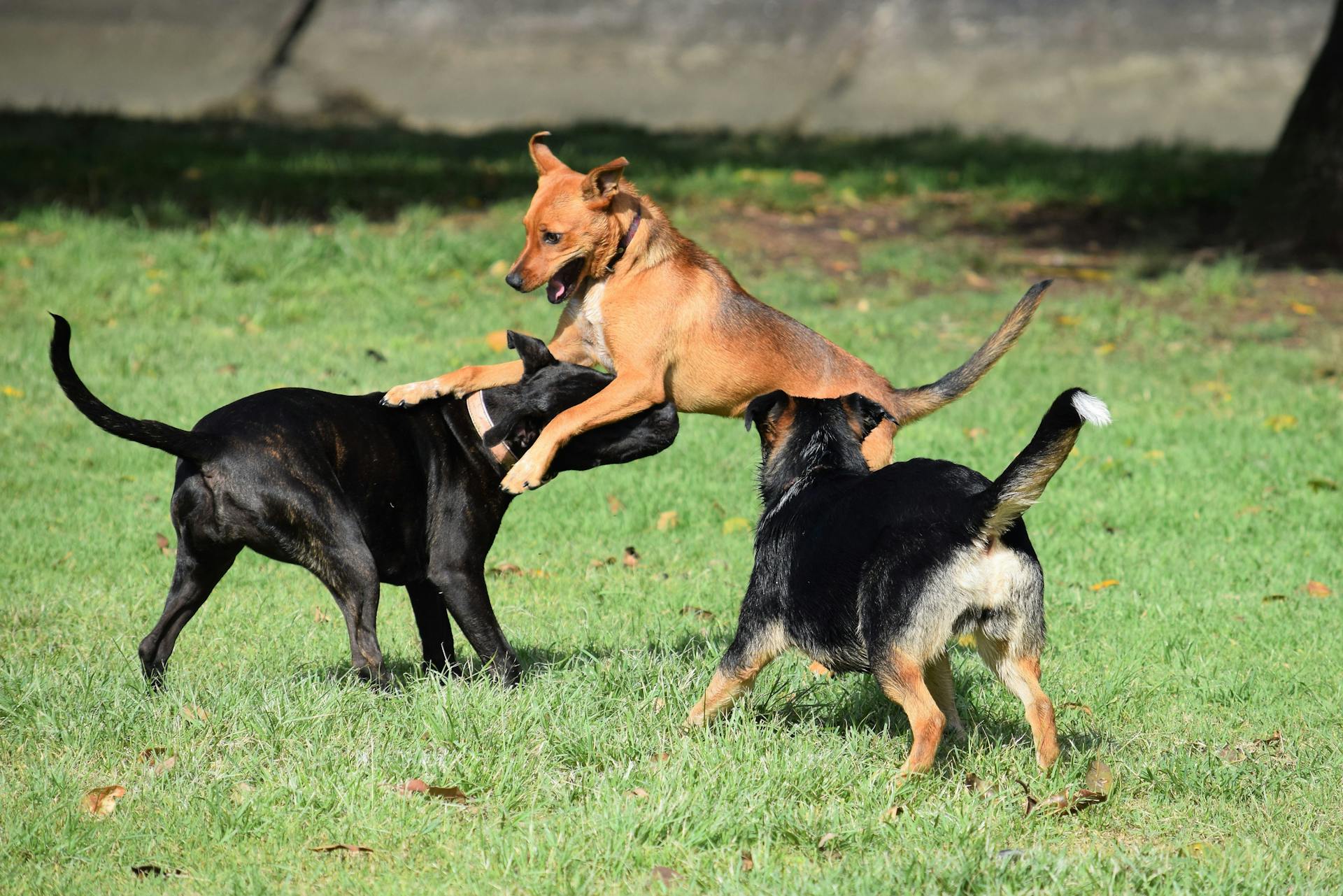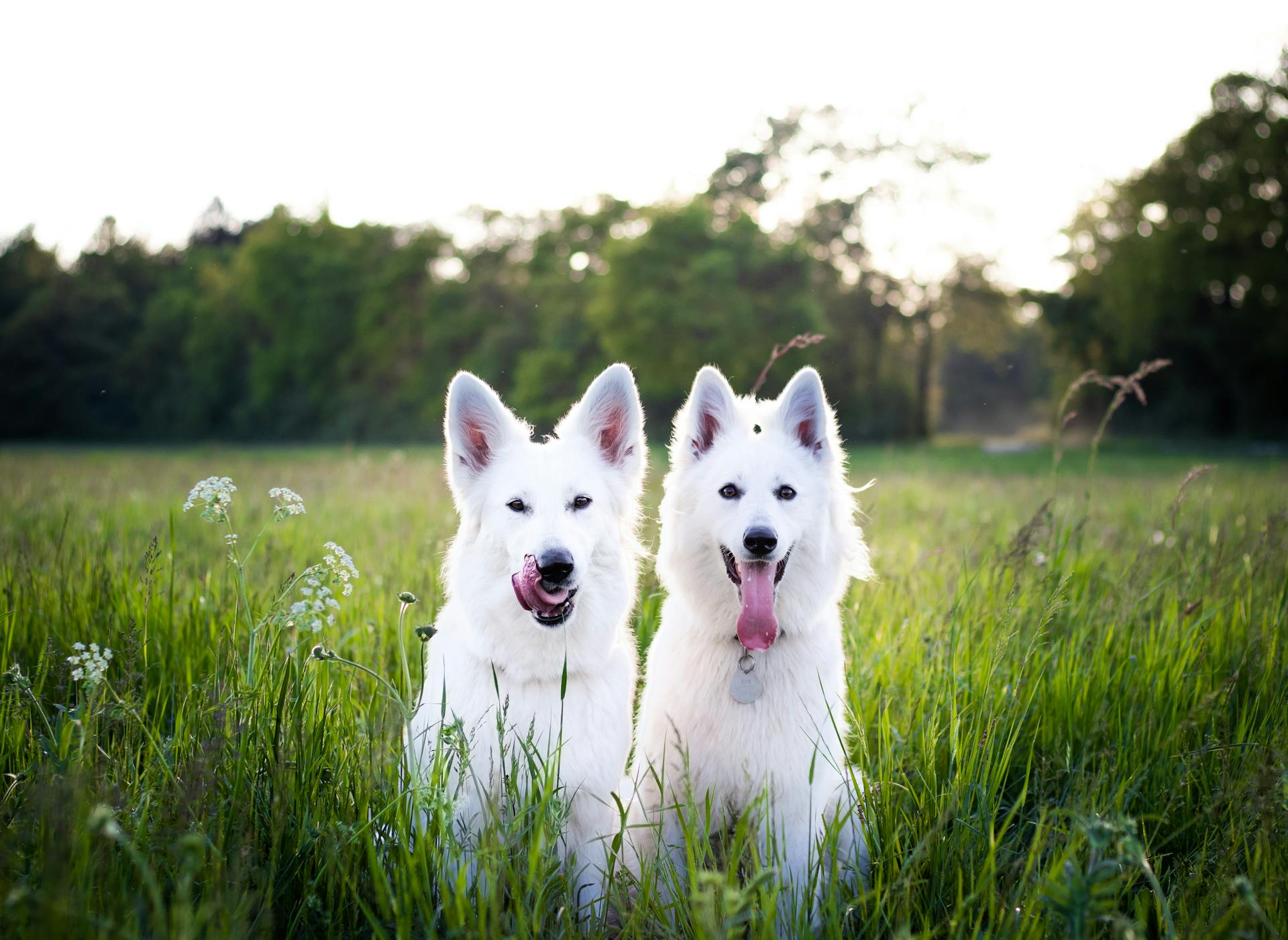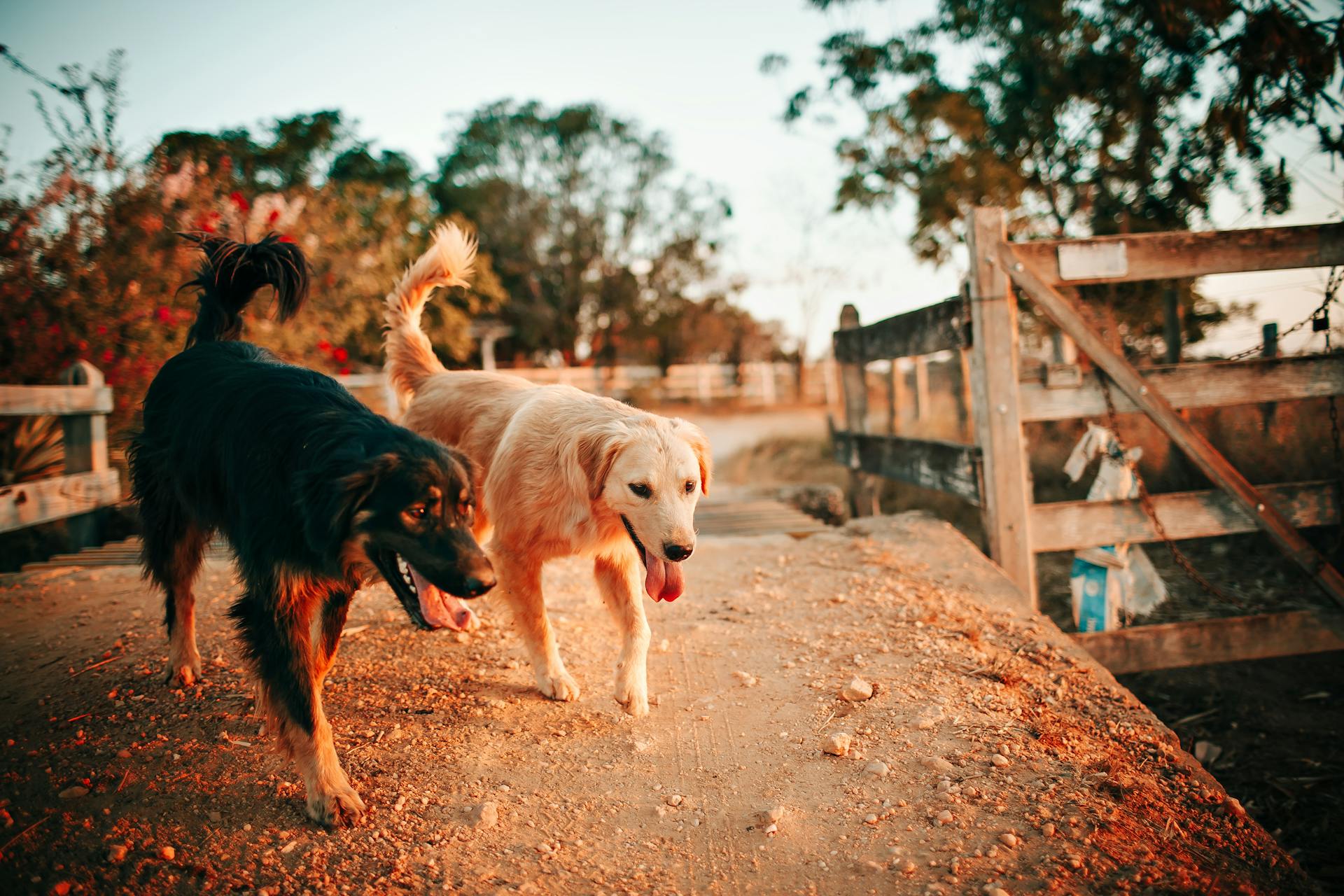
Dogs love snacking on sunflower seeds, and it's not hard to see why - they're a tasty and nutritious treat.
Sunflower seeds are a good source of protein and healthy fats, making them a great addition to your dog's diet. They also contain vitamins and minerals like vitamin E and selenium.
But before you start sharing your sunflower seeds with your furry friend, it's essential to know the potential risks and guidelines for safe consumption.
Sunflower seeds can be a choking hazard for small dogs, so be sure to supervise them closely when giving them seeds as treats.
Expand your knowledge: Sunflower Seeds
Benefits and Uses
Sunflower seeds are a nutrient-rich snack for dogs, boasting healthy fats and vitamin E that can contribute to a glossy coat and skin health.
These tiny seeds are a good source of vitamin E, magnesium, protein, and fatty acids, making them a healthy treat to share with your pooch.
Vitamin E in sunflower seeds may help reduce swelling and support immunity, while manganese promotes normal brain activity and nerve function.
Linoleic acid, a type of unsaturated fat, is essential for dogs and helps keep the skin and coat healthy and strong.
Dogs need small quantities of healthy fats like linoleic acid to keep their body running smoothly, regulating temperature and maintaining a healthy coat.
Sunflower seeds are a great addition to a balanced dog food diet or can be given as a treat, as long as they're plain, shelled, and unsalted.
How to Safely Feed Your Pet
To safely feed your pet sunflower seeds, start by offering plain, unsalted, and unseasoned sunflower seeds. Shelled sunflower seeds are easier to digest, so it's best to remove the shells before sharing with your pet.
When introducing sunflower seeds to your pet's diet, start slow and watch for any reactions. Try offering one or two sunflower seed kernels at first and monitor your pet in case of an upset stomach. If they're okay after a few hours, you can share a few more.
To mitigate the choking hazard associated with sunflower seeds, consider crushing or grinding them before offering them to your pet. This reduces the risk of seed-related respiratory issues and makes it easier for your pet to digest the seeds.
Here are some general guidelines for feeding sunflower seeds to your pet:
If your pet eats sunflower seeds with hulls on them, keep an eye out for digestive discomfort. If they eat a whole bag of them, contact your veterinarian for guidance and advice.
Potential Risks and Dangers
Sunflower seeds can be a tasty and healthy snack for dogs in moderation, but there are some potential risks and dangers to be aware of.
Some types of sunflower seeds, such as those with added sugar or salt, can be bad for dogs. These additives can lead to weight gain, high blood pressure, and other health issues.
If your dog ingests a large number of unshelled sunflower seeds, it can result in a complete obstruction of the stomach or intestinal tract, which is an emergency situation that may require surgical intervention.
Unhusked seeds, large quantities, and birdseed can also cause problems for dogs. Additionally, seasoned or flavored sunflower seeds, as well as those mixed with harmful ingredients, can be particularly hazardous.
Here are some potential hazards to watch out for:
- Unhusked seeds
- Large quantities
- Birdseed
- Seasoned or flavored
- Mixed with harmful ingredients
- Underlying conditions
If your dog shows signs of digestive distress, such as vomiting, diarrhea, or lethargy, after eating sunflower seeds, it's essential to monitor their condition and adjust the quantity or type of sunflower seeds accordingly.
Potential Risks
Feeding your dog sunflower seeds can be safe in moderation, but there are some potential risks to consider.
A large number of unshelled sunflower seeds can cause a complete obstruction of the stomach or intestinal tract, which is an emergency situation that may require surgical intervention.
Some dogs may experience diarrhea, especially if they eat too many sunflower seeds, which can become a serious issue if it lasts for more than two days or is accompanied by vomiting.

High blood pressure in dogs can be a silent killer, and there are often no outward symptoms until it has progressed to a dangerous level.
If your dog has gut problems or underlying diseases like pancreatitis, they may be more at risk of experiencing adverse effects from eating sunflower seeds.
Sunflower seeds are high in fat, which can contribute to unwanted weight gain and lead to problems like obesity, arthritis, and diabetes.
Unshelled sunflower seeds can cause a blockage or gastrointestinal pain, so it's essential to remove the husks before feeding them to your dog.
Birdseed, which often contains sunflower seeds, can be toxic to dogs if they eat large amounts, especially if it's spoiled.
Sunflower seeds with added sugar or salt are not advisable, as they can contribute to problems like high blood pressure and weight gain.
Here are some potential hazards to watch out for when feeding your dog sunflower seeds:
- Unhusked seeds
- Large quantities
- Birdseed
- Seasoned or flavored seeds
- Seeds mixed with harmful ingredients
- Underlying conditions
Signs of an intestinal blockage include vomiting, lethargy/weakness, loss of appetite, and abdominal pain. If you notice any of these symptoms after your dog eats sunflower seed shells, call your vet for medical attention.
Is Oil Bad for Health?

Some oils can be bad for your health if consumed in excess. Sunflower oil, for example, can cause an upset tummy if too much is ingested.
Even small amounts of certain oils can be problematic if not used correctly. A small amount of sunflower oil may not cause harm, but too much can lead to issues.
It's essential to be mindful of the essential fatty acids found in oils like sunflower oil. These fatty acids can be great for dogs, but they can also cause more harm than good if supplements are given incorrectly.
Some oils are perfectly safe to use in moderation, but it's crucial to follow the recommended amounts to avoid any potential issues.
See what others are reading: Dogs Not Eating but Drinking Water
General Information
Dogs can eat sunflower seeds in moderation as a tasty and nutritious snack.
Sunflower seeds are a good source of protein, fiber, and healthy fats, making them a nutritious addition to a dog's diet.
Dogs should not eat the shells of sunflower seeds, as they can be a choking hazard or cause digestive issues.
Intriguing read: Dogs Eat
Linoleic Acid
Linoleic acid is an essential fatty acid that dogs can't make on their own, so they need to get it from their food. Sunflower seeds are a rich source of omega-6, with nearly 50% linoleic acid.
Dogs with skin and coat issues often benefit from linoleic acid supplementation.
What Are?
Sunflower seeds are a popular and readily available product cultivated from the sunflower plant with its recognizable bright yellow flower and tall stem.
There are different types of sunflower seeds, classified as black (oilseed) or striped (confectionary).
They can be sold with their husks or without them, and some people may refer to the seed as the edible middle part, also called the kernel.
Sunflower seeds can be prepared in different ways, such as roasted, seasoned with salt or spices, or mixed with other ingredients.
It's essential to consider all these differences when talking about their safety for your pet, as some preparations may harm your dog.
Guidelines and Limits

Dogs can eat sunflower seeds, but only in moderation. Even healthy treats like sunflower seeds should make up only 10% of your dog's diet.
To give you a better idea, here are some general guidelines for portion sizes for healthy, adult dogs:
It's also a good idea to remove the shell (or husk) of a sunflower seed before feeding them to your furry friend. If eaten, these can irritate your dog's gut.
Frequently Asked Questions
What seeds can dogs not eat?
Dogs should avoid apple seeds and heavily seasoned or salted seeds due to potential toxicity. Always check the safety of seeds before sharing them with your furry friend
Sources
- https://www.petmd.com/dog/nutrition/can-dogs-eat-sunflower-seeds
- https://www.dispatch.petfinn.com/blog/articles/can-dogs-eat-sunflower-seeds
- https://www.caninejournal.com/can-dogs-eat-sunflower-seeds/
- https://www.mypetsensitivity.com/blogs/news/can-dogs-eat-sunflower-seeds
- https://www.dogster.com/dog-nutrition/can-dogs-eat-sunflower-seeds
Featured Images: pexels.com


